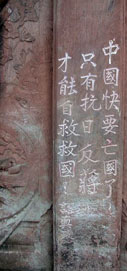
Resources
Teacher Resources
How do the villagers of Xiakou understand their history? What memories and meanings from the past still animate their place, and how are they remembered and explained? How does that local understanding of history reiterate or differ from historical narratives based on the nation-state, China, as subject?
The essays in this section are organized around a periodization that roughly corresponds to the way villagers mark the turning points in their past, with two exceptions: the essays Early history and Qing Dynasty are named to broadly group long periods of time that local people might divide according to a more precise dynastic history or specific event (e.g. "The end of the Ming, beginning of the Qing," "migration from Hubei," "the twentieth year of the Qianlong Emperor") or, even more likely, lump together into the even broader category of "The Old Society" (jiu shehui).
The remaining categories are closer approximations of historical periods as the villagers use them, based on their experience and marking events that fall within their horizon of memory. The sources for these essays are oral histories drawn from interviews with older residents of the village, information found in the gazetteers of Ya'an county (xianzhi) and Yazhou prefecture (fuzhi), as well as local texts such as family genealogies (jiapu), and tomb and temple inscriptions. Our goal is not to attempt an "objective reconstruction" of local history, but rather to explore historical memory and to suggest the continued relevance of the past in lived experience of the present.
History Essays
- Early History: Warring States (475-221 BCE) to the Ming Dynasty (1368-1644) [Summary]
- Qing Dynasty
- Nationalist Period: Reflections on the "Old Society"
- Liberation and the 1950s: Two Images of the 1950s
- Great Leap Forward and Famine
- The Collective
- Reform
